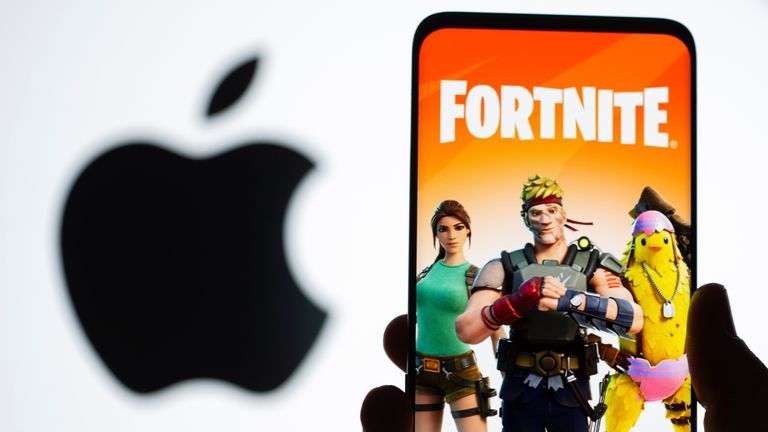A US judge has told Apple it must ease its restrictions on in-app purchases, following a lawsuit brought by Fortnite creator Epic Games and other publishers.
The iPhone and iPad seller has been told it cannot stop developers from showing buttons or links that allow customers to pay for things outside of Apple’s own payment processing system.
Epic had wanted the judge to go further, calling for Apple to be designated an illegal monopolist.
But US District Judge Yvonne Gonzalez’s said the games company failed to prove this point in their arguments – although she said they did show Apple engaged in “anticompetitive conduct” under California law.
Epic says it plans to appeal the initial decision, and Apple says it has not ruled out an appeal either.
Apple charges as much as a 30% commission on transactions made through its platform – including on things like a Netflix or Spotify subscription.
Spotify’s chief legal officer said the firm was pleased with the decision on Apple’s “anticompetitive” conduct.
The injunction only covers the US, but Apple has made a similar change in Japan due to an investigation by the competitions watchdog there.
The UK’s Competition and Markets Authority started an investigation into Apple’s practices in March.
Fortnite, Epic’s flagship game, is free to play, but customers can pay for cosmetic changes to characters and other perks.
The trial heard that Apple made at least $100m (£72.2m) from processing sales for Fortnite in the past two years.
Epic was supported in its petition by a number of other software companies, including Spotify and Match Group, the owner of Tinder.
Following the announcement in the US, the value of Apple fell by $87bn (£62.8bn) – although its capitalisation still remains in excess of $2tn (£1.4tn).
Judge Gonzalez’s ruling came three months after the trial into the matter.
She said that developers can put into their apps “buttons, external links, or other calls to action that direct customers to purchasing mechanisms”. But the judge declined to force Apple to open its devices up to alternative application marketplaces.
In a statement, Apple said: “As the court recognised, success is not illegal.
“Apple faces rigorous competition in every segment in which we do business, and we believe customers and developers choose us because our products and services are the best in the world.”
In Japan, Apple agreed to allow “reader” apps – like Netflix – to show links for customers to sign up outside of the Apple ecosystem.
The investigation by the UK’s CMA is probing “whether Apple imposes unfair or anti-competitive terms on developers using the App Store, ultimately resulting in users having less choice or paying higher prices for apps and add-ons”.

